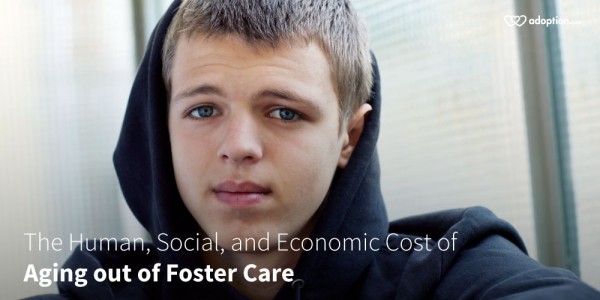May is recognized as National Foster Care Awareness Month. A lot of focus is given to younger children in the foster care system. We go to great lengths to ensure that these children find forever homes, either through adoption or through the reunification process. This is an important work and should be applauded. However, this May, I would like to address the growing number of adolescents approaching the dreaded 18–21 year age mark that will push them out of the foster care system altogether. This growing number is now over 20,000 young adults each year.
20,000.
This is the number of faces that are looking to the world, our world, for acceptance and love and stability.
This is the number that contributes to one third of the nation’s teenage homeless population*.
This number also comes with a cost, and not just a financial one.
The Adoption Advocate, a publication of the National Council for Adoption, recently published an article entitled “The Human, Social, and Economic Cost of Aging out of Foster Care.”
It reads, “Youth that age out of foster care are far more likely than their peers to become homeless, dependent on welfare, turn to drugs, or be incarcerated. Truly, this is an American tragedy.” It goes on to say, “These are our own children, living in our towns, on our streets, attending our schools. The resulting social and economic costs, primarily for the states that are charged with their welfare, are huge.”
For 18-year-olds who have grown up in a nurturing environment, and whose parents have encouraged them over the years, the transition into college is typically a relatively smooth one. These newly minted adults also have the comfort of knowing that they are supported—no matter what.
But 18-year-olds aging out of the foster care system don’t have that kind of support. They live their lives with a constant fear of failure. Many of these 18-year-olds have lacked the support to even complete their high school education, which has contributed to an increase in the nation’s drop-out rate. Additionally, some have turned 18 and are unable to sign up for the GED, enroll in college, or apply for a job because important personal documents, such as a birth certificate, have been lost along the way.
The majority of homeless young adults are individuals who have aged out of the foster care system. These young adults experience a large amount of insecurity due to failed permanency and constant changes in environment. These young adults lack many things most of us take for granted, such as a place to go for the holidays or family support. Again, from the Adoption Advocate’s article: “Studies have shown that confidence, self-knowledge, and healthy physical and mental development depends on strong, permanent attachments that occur in early childhood and continue into adulthood.”
Accompanying the rising number of youth aging out of foster care is an increased cost to the state to address issues that arise as a result . Statistics show that this demographic (aged-out youth) contributes to a large portion of the nation’s incarceration rates, in addition to contributing to homelessness. Both of these require more and more funding. In addition, many of these young adults are not acquiring jobs and becoming able to contribute back to society financially.
So how do we, as citizens, help alleviate this growing concern?
We can work with our local and state governments, and we can reach out to private organizations. For some, that may look like adopting a child who is getting close to aging out of foster care. To provide them with love, nurturing, stability, home, and a family. For others, it may be donating time or financial resources to organizations that assist these young adults in gaining essential life skills so they have the tools they need to avoid incarceration, homelessness, or worse. Or it may be simply advocating or supporting those who are providing more tangible support, such as food and clothing. The point is that we all have a role in solving this problem. Even though we may not be able to eliminate it, we can all work together to ensure that fewer young adults go into this world feeling unloved and ill-prepared.
* Statistic from www.covenanthouse.org

